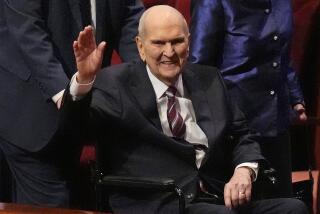Presbyterian Leader Denied New Term
- Share via
It was a telling moment last week at the General Assembly meeting of the Presbyterian Church (USA) when an emotional Rev. James D. Brown stood to address his colleagues who had, just one day before, booted him out of his leadership role as head of the denomination’s General Assembly Council.
The council had been expected to approve Brown--who was running unopposed--for a second term as the denomination’s chief management official. But in a sign of growing grass-roots disaffection with the church’s national leadership, the assembly refused to authorize another term.
Brown--who was senior pastor of St. Peter’s by the Sea Presbyterian Church in Rancho Palos Verdes when he was first elected to the national post in 1992--choked back tears as he addressed the assembly, which functions as the 2.7-million member denomination’s board of directors.
“We are sort of out of focus in the structure of the church,” he acknowledged.
The description was intended to apply to Brown’s relationship with the governing board, but might be used to describe the denomination itself, which last weekend concluded eight days of deliberations over church policy at its 208th General Assembly--a session that revealed a church torn by deep-seated theological and social disputes.
In many respects, Brown, the denomination’s top national bureaucrat, became the scapegoat for the frustrations, divisions and contradictions that ripple through the membership, not only of the Presbyterian Church but other mainline denominations, smaller evangelical churches and other religious bodies.
Nowhere in the eight days and 900-items agenda was this more telling than on the issue of homosexuality, an issue that has dogged the denomination and American public life for two decades.
At issue for the Presbyterians was a proposed amendment that would change the church’s rule book, known as the Book of Order, to deny ordination as pastor, elder or deacon to practicing homosexuals.
“Those who are called to office in the church are to lead a life in obedience to Scripture and in conformity to the historic confessional standards of the church,” the amendment reads. “Among these standards is the requirement to live either in fidelity within the covenant of marriage of a man and a woman, or chastity in singleness. Persons refusing to repent shall not be ordained and/or installed as deacons, elders or ministers of Word and Sacrament.”
After 90 minutes of debate and two minutes of prayer, the amendment was approved by a 313 to 236 vote--a solid victory for opponents of gay ordination, but also a dramatic reflection of how closely the church is divided on the issue.
The amendment will now be sent to the church’s 171 presbyteries--or local clusters of churches--and a majority must approve it for the amendment to become church law.
However, the delegates also voted to have the church go to court in support of “committed same-sex” partners who “seek equal civil liberties in a contractual relationship with all the civil rights of married couples.”
The conflict inherent in the two measures on homosexuality led one Albuquerque observer to say that the meeting would be remembered as the “ ‘However’ Assembly.”
In another apparently contradictory decision, while rejecting Brown and the national bureaucracy he symbolized, the delegates reached into that same bureaucracy to overwhelmingly elect--on the first ballot--the Rev. Clifford Kirkpatrick as the church’s new Stated Clerk, or top ecclesiastical officer.
Kirkpatrick received 386 votes, or 71% of the ballots cast, in a field that included four other candidates.
Kirkpatrick, director of the denomination’s international ministries division since 1981, will serve a six-year term. He succeeds the Rev. James Andrews, who is retiring.
And while the delegates adopted a major social policy statement, “Hope for a Global Future: Toward Just and Sustainable Human Development,” they rejected spending any money to implement its proposals.
In the end, the 208th General Assembly may have appeared unfocused. But in seeking to chart a moderate course through competing factional demands, it very closely resembled American society, which itself is deeply riven by ideological absolutes of every persuasion.
More to Read
Sign up for Essential California
The most important California stories and recommendations in your inbox every morning.
You may occasionally receive promotional content from the Los Angeles Times.










